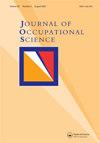走向突出和团结:认知发展在职业科学、职业治疗中的重要性,以及它们之间的关系
IF 2.9
Q1 SOCIAL SCIENCES, INTERDISCIPLINARY
引用次数: 1
摘要
尽管历史不同,但职业科学和职业治疗都关注职业及其所有复杂性,以及人们在社会中的参与和包容。在这篇演讲中,我描绘了每个学科的认知发展是如何通过一系列相互联系的命题将它们更紧密地联系在一起的。我认为,这种关系的加强使社会中职业问题的代表性和政治化程度得以提高,我用两个关键的例子来支持这一发展。此外,这一发展增强了我们的社会知名度,增强了我们彼此之间以及与(经常被边缘化的)人群之间的团结。最后,我建议对未来合作、解放行动的可能性进行重新设想。本文章由计算机程序翻译,如有差异,请以英文原文为准。
Towards salience and solidarity: The importance of epistemic development in occupational science, occupational therapy, and the relationship between them
ABSTRACT Despite different histories, occupational science and occupational therapy share a central concern with occupation, in all its complexity, and the participation and inclusion of people in society. In this presentation, I chart how epistemic developments in each discipline have brought them closer together through a series of linked propositions. The strengthening of this relationship, I argue, has enabled greater levels of representation and politicization of occupational issues in society, a development I support with two key examples. Additionally, this development has enhanced our societal salience and our solidarity to each other as well as with [often marginalised] communities of people. In closing, I suggest a reworked vision of possibility for future collaborative, emancipatory action.
求助全文
通过发布文献求助,成功后即可免费获取论文全文。
去求助
来源期刊

Journal of Occupational Science
SOCIAL SCIENCES, INTERDISCIPLINARY-
CiteScore
4.30
自引率
41.70%
发文量
46
 求助内容:
求助内容: 应助结果提醒方式:
应助结果提醒方式:


